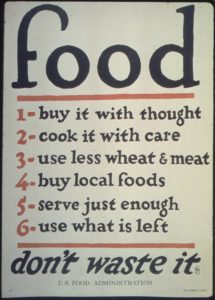An Expedia Promo Code is What Started It:
We’ve all been there. You get a free delivery offer from MyProtein, and you want to eat as healthy as you can. But is the food local? And what does being a locavore even mean?

The term “locavore” describes someone that likes to eat locally grown food. It’s a trend that is not only good for the environment but good for small farmers and local agricultural industries. The “eat local” trend is all about eating foods that do not need to be shipped thousands of miles before landing on your grocery shelf. It’s about eating food that does not have to be laden with artificial substances to ensure that it lasts way beyond its natural period of freshness. Most importantly it’s about adjusting our diets to eat food that is in season for the regions we live in and it’s this last point that can be difficult for some.
Many of us have become accustomed to being able to purchase popular produce like strawberries and asparagus during times of the year when they are out of season for our region. That convenience has a significant impact on the environment when that strawberry has to be shipped via air or roadway from California to Ohio. According to the Washington non-profit group, Worldwatch, food sold in American supermarkets travels on average about 1,500 miles from the farm to the consumer. This represents a 25% increase from 1980.

That’s a lot of fuel consumption and pollution creation all to satisfy our penchant for out of season and out of region foods. The challenge for supporters of the local food movement is to discover tasty and interesting diets that can be grown within a 100-300 mile radius of communities. If you will be heading out of town to a different community you can experience different kinds of local foods, and you can click here to save on car rentals.
Do you know what kinds of local produce are available at different times of the year in your community? One of the best places to start this research is at your local farmers’ market, food co-op or organic food store. In fact any local food shop that is focused on carrying healthy locally and ethically grown food should be able to give you some advice.
Community Supported Agriculture or CSAs are another new development in the local food movement that is helping to make the locavore lifestyle more sustainable. CSAs are an agricultural business model that helps to connect local organic growers directly with customers. They help struggling farmers to connect with a steady customer base.
Certain seasons are more difficult than others for locavores. It’s no surprise that wintertime CSA distributions may have less variety than summertime distributions – but with come creativity and wonderful winter recipes eating local can be very tasty. Winter CSA distributions tend to include root vegetables that the farms have stored in cellars in addition to freshly harvested produce. Choices of produce for those of us in northern climates may include potatoes, kale, carrots, parsnips, leeks, beets and rutabagas.
The popularity of the locavore as a movement is helping to educate consumers about the nutritional and ecological benefits of eating locally. The more consumers know the more they’ll demand the choice and availability of home grown food. This is great news for small farmers and entrepreneurs who all contribute to the home grown food we’ve all come to love and to re-discover with great enthusiasm. If you are buying locally or within your state, your food will have a smaller carbon footprint. This in turn will help to protect our environment. You will find that more and more restaurants are now adopting this approach within their menus, providing the regional information of their ingredients. It’s good business for the customer, the restaurant and the farmers.
A study recently found that the average shopping basket contained items had traveled over 70,000 kilometers to reach Melbourne. This figure is staggering as so many of these items are available locally and are of excellent quality. Convenience has been at the heart of this issue with major supermarkets selling items that are relatively cheap to produce and import. If you start looking for the local producers in your area, you will be amazed by what you find. In Victoria alone the local cheese, wine, olive and Wagyu beef industries are phenomenal.
Locavore has become so poplar that it is now being studied at Universities under the course title of Social Innovation. Students are only able to eat food produced and grown in a radius of 160km (100 miles) for one month. Their experiences changed what they ate and the way in which approached food. It has also helped develop many new dishes. The course has been a great success.
Finding local produce is easier than you may think. Farmers markets are held in Melbourne suburbs weekly and provide a wide range of locally grown and produced food. While it may not always be practical for busy people to travel to the markets regularly, there are other options available to access fresh food. As demand increases, many stores are now providing home delivery which has been a booming success. There are many online delivery services for fresh, local produce saving you time and in some cases money. You can order a mixed box or choose the individual items that you would like to have included. The great thing about this is you will have access to changing seasonal produce.
With the growing interest in locally produced organic food, a change is occurring in the way we source our food and what we choose to buy. Some supermarkets are becoming aware of this and are looking to provide organic and locally produced items. Help to support your community by buying from local producers and farmers.
Buying produce from your local farmers means you only get produce that’s in season. By buying Australian grown you’re avoiding the lengthy and environmentally unfriendly process of having your food imported from other countries. While you may think you want asparagus at your fingertips year-round, the best time to buy it is when it is in season in Australia – it’s fresher and cheaper.
Right now, we have ‘energy to burn’… or do we? While we’re ‘burning’ (excuse the pun) through our oil energy reserves we can import and export food freely. When these options become scarce, costs will rise for transporting food and prices will go up. By investing in our future farmers now, we’re establishing a strong food economy, helping our environment and our neighbours. Win. Win. Win.
So how do you go about becoming a Locavore? Well, we suggest starting doing some research. See if you have access to a local farmer’s market and start shopping there. If you have to use your local shops always check the independent fruit shop and butcher first as they are more likely to use local products. At the supermarket, buy what’s in season and try to avoid imported.
For clothing and other items, you may need to shop online but try and buy as close to you as possible and always look for organic and sustainable options.

